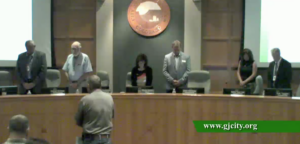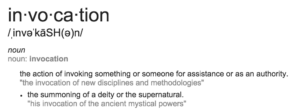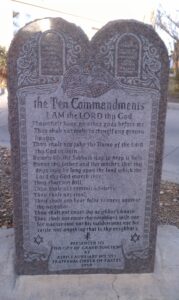“We are mindful that this 21st century brings a new diversity of citizens. We must strive to make our government sensitive to the values of Americans with minority views, whether religious, political or otherwise.”
— The City of Grand Junction’s website

“During the invocation, you can sit, stand or leave the room.”
That’s what Grand Junction’s mayor tells citizens who would rather not have to worship Jesus Christ at the City’s public meetings. The statement assumes someone is going to be offended by the Christian prayers that come next.
But Council is okay with offending some citizens because Christianity has long been the preferred religion of City Council, and they use their taxpayer-funded public meetings to flaunt it.
The truth is there is a stark contrast between what City Council says publicly about its attitude toward religious diversity and the lip service it pay towards actually respecting religious diversity.
If you’ve ever been to a Grand Junction City Council meeting, you’ve seen the religious pageantry that starts many of their meetings: First the mayor calls the meeting to order, then tells everyone to stand for the Pledge of Allegiance and remain standing for the invocation (prayers). Almost invariably, the prayers are in the name of “Jesus Christ,” effectively turning the public meeting into a Christian church service as members of the audience and Council obediently bow their heads, clasp their hands and mumble “Amen” at the end.

But City Hall is not a church. It’s a taxpayer-funded public building and the entire public is invited to attend meetings there, not just Christians. Under these circumstances, such religious displays are awkward and out of place at best, divisive and prejudicial at worst, for the overt favoritism Council shows to those who belong to the Christian religion.
If you have to attend a City Council meeting and don’t want to be subjected to the sectarian prayers, you’re out of luck. City Council has settled the matter, they believe, by telling the public you can just “leave the room” if you don’t like it.
Nice way to welcome a diverse citizenry to City Hall.
First Request from Citizens to Respect Religious Diversity: 2001
Council has clearly gotten the message by now that their sectarian prayers alienate some City residents, but they apparently just don’t care.
Council has been overt about its preference for Christianity for years. The Ten Commandments tablet on City Hall’s front lawn is evidence of this.
In 2001, a group of citizens asked Council to remove the tablet, saying it was an inappropriate endorsement of religion on public property and violated the separation of church and state guaranteed in the U.S. Constitution. The ACLU even sued the City over it, making the message even clearer. Despite this, Council went to great lengths, contortions and expense to assure the tablet stayed put firmly on City Hall’s lawn. The only religion represented in the display on the City’s front lawn is Christianity. There are no monuments to Judaism, Buddhism, Islam or any other religion.
So much for respecting religious diversity back in 2001.
Second Request: 2009

A protest of the City’s endorsement of Christianity occurred again in May, 2009, when Western Colorado Atheists and Freethinkers formally asked City Council to stop hosting prayers to “Jesus Christ” at their regular public meetings. Seven WCAF members sat down with City Attorney Dan Shaver and explained that the persistent Christian prayers at public meetings made it look like the City preferred Christianity over other religions, and over non-religion. The prayers divided citizens along religious lines, made some meeting attendees feel like outsiders and violated the establishment clause of the First Amendment, which aims to keep government and religion separate. WCAF wanted invocation speakers to stop naming a specific deity in their prayers, to make the meetings feel more inclusive rather than exclusive. At the time, prayers before Council meetings were 90 percent Christian, 10% token Jewish.
Shaver agreed that the City’s persistent Christian invocations violated the law, and recommended Council change the invocation practice to comply with law.
But again Council connived to dodge this opportunity to honor religious diversity. They refused to “censor” the invocation. In a nod to accepting some diversity, under pressure they agreed to let anyone come and say an invocation before meetings regardless of religious or group affiliation. They also adopted a policy that stated speakers should not “exploit the invocation opportunity to proselytize.” The new policy also says that if an invited person fails to show up to say and invocation, Council will hold a moment of silence instead.
Since then, Council has had more moments of silence in lieu of prayers at their meetings, which does help show more respect for religious diversity. Yet time and again, religious figures who do show up to give invocations before Council meetings openly proselytize by saying name of “Jesus Christ,” and Council simply ignores these violations of their own policy.
Third Request: 2013
After seeing repeated breaches of their new invocation policy, in 2013, WCAF pointed out to the City that religious representatives they invite to say the invocation have continued to use the opportunity to proselytize for Christianity by invoking the name “Jesus Christ” at public meetings, even though the City’s policy asks them not to. Again WCAF asked the City to enforce their own invocation policy and put an end to their divisive, overt public preference for Christianity.
Council did not respond to the request. Rather, they continued to host Christian prayers at public meetings, effectively thumbing their nose at years of citizens’ requests to respect religious diversity. To this day Council has not admonished a single violator of their policy prohibiting use of the invocation to proselytize.
Thus Christian prayers remain part of Grand Junction City Council public hearings, clearly by design. Multiple groups have failed to enlighten Council about what respect for religious diversity really entails: showing no favoritism towards any one religion.
Lip Service
The statement the mayor makes at the beginning of Council’s public meetings that attendees can “sit, stand or leave the room” during the invocation, presumes the prayer will offend some attendees. It’s a statement that negates the City’s claim on their website that they strive to respect religious diversity. Rather, it’s the opposite; Council has actively worked to preserve religious divisiveness at every turn, ignoring pleas from citizens over many years to treat all religious groups, and people of no religion, equally by remaining steadfastly neutral in matters of religion.
It’s 2016. Council Needs to Figure it Out.
Maybe Council can learn from what happened at CMU last fall with a planned, on-campus bible distribution.
In November, 2015 a group of Colorado Mesa University (CMU) nursing students asked CMU President Tim Foster to stop Gideon Bible giveaways at their pinning ceremony, and at future pinning ceremonies, saying it was an overtly Christian practice and had no place at a public school. After consideration, Foster concluded religious endorsements by the school were divisive and disrespectful towards non-Christian students and their parents, and because the school is supported by taxpayer funds, endorsements of Christianity on campus also violated the U.S. Constitution. Foster “got it,” and perhaps because he is an attorney himself and has a better grasp of the law, he decided the right course of action was to end Bible giveaways at CMU events forever.
Foster explained his decision in an op-ed in the Daily Sentinel, saying,
“Freedom requires respect for everyone’s beliefs.”
That’s right. Freedom requires respect for everyone’s beliefs.
What is meant here is the kind of respect backed up by actions, not the disingenuous kind of bobbing and weaving and lip service Grand Junction City Council has dished out to area residents for the last 15 years when faced with similar requests to end blatant endorsements of Christianity by the City.

JESUS CHRIST of Nazareth our Lord and savior is the way the truth and the life. believe repent or perish in an everlasting lake of fire. sounds to me like a spiritual war is going on and JESUS already won that war on the cross!
Respect council has learn to. Tolerate we no longer. Act now must we, eh?
YODA! GET OFF OF MY COMPUTER!
Do you understand why people erect monuments? I don’t think you do.
I’d the city council discussing “the word” during meetings? Not in any that I’ve attended.
You’re an adult. A thin skinned, whinging and misguided adult. Our presidents take the oath of office with their hand on what? Al Quran?
The house and the Senate invoke what, when they come to order?
You people are worse than roaches.
Your comment is B.S. Just because the majority agrees open something, doesn’t mean it true. (Cough cough A flat earth cough)
And just because the Goverment uses the bible doesn’t mean it’s true and its lawfully right. In fact, it’s illegal.
I have some Tibetan Prayer flags. I could drape them over the 10 commandments tablet or any other place one might deem wise.
Apply to say the invocation. Send your contact information to Stephanie Tuin, City Clerk, G.J. City Hall, 250 N. 5th Street, GJ 81501. Then you can do whatever you want if you get picked. There’s no limit on what you can say or do for the invocation, no time limit, no censorship, screening, nothing. So go and have a good time!
Rob, you missed the point entirely. I care not that the “invocations” are steeped in Christianity, Judaism, Islam or the Whirly Flies. The point is the “religious” portion of the meeting is conducted during meeting times. It becomes a part of public record on public lands supported by the public.
If the City Council believes this deeply in their need for guidance, they can pray together before the meeting, during break or after the meeting.
Once the Pledge of Allegiance is recited, God is already invoked and the meeting has begun and blessed. To do another religious-based “pledge to God” after the Pledge of Allegiance (POA), suggests the Pledge is impotent to those that are taking it and to the witnesses, Thereby requiring a further show of devoutness. The POA is secular in the statement of “GOD” and was not a part of the original Pledge. But to ALL Americans it has some level of agreed upon meaning. Atheists and Agnostics may not agree with the statement “Under God”, but I think the Pledge is nationally recognized as the promise of the citizen and does not require further show commitment to the nation.
If you have been in law enforcement or in the military, you would have taken an Oath to this Nation. The Pledge of Allegiance is a reiteration of that for lay people and those that serve.
I just retired from Delta Cty Sherriff’s office and spent 14months in that “crazy old Asian War” on 66&67. Guess I’m guilty on both counts.
Hmm, I fear thou doest protest too much. Simple solution get up and leave. I might not, in many cases agree with you but respect your right to disagree. Are you not “guilty” of forcing your belief or non belief on the council and by the by I’m no fan of their’s. I live in the county and feel same way about BOCC